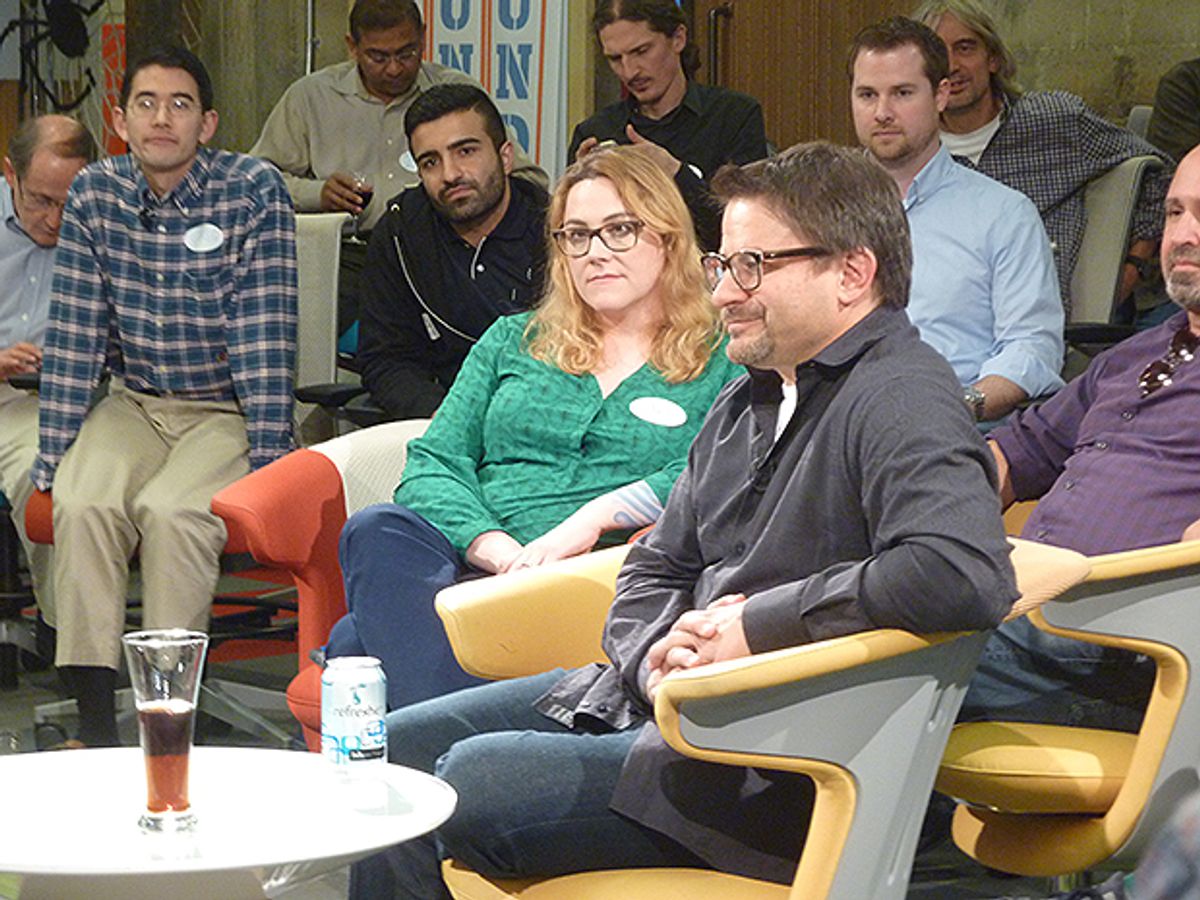Several interesting theories were batted about in a wide-ranging discussion about today’s hot technologies that took place last week at a quarterly salon hosted by the AT&T Foundry in Palo Alto, Calif. The parameters of the official topic, how society will handle the issues of privacy and safety created by the coming wave of new technology, quickly expanded to include a lively debate about what is coming, when is it coming, and how the heck will people make money off of it.
The AT&T Foundry’s salon, tagged FutureCast, follows a standard format (this was the second such event I attended). The Foundry invites about 50 startup founders, academics, executives of local tech companies, journalists, and public officials “to vet, to debate, and ultimately to spark ideas that will set the course for [the] collective technology future.” The attendees mingle over drinks for about an hour, chatting with each other or looking at demos from a few still-quasi-stealth startups. Then they gather in a semicircle around moderator Andrew Keen and an invited guest of honor, in this case, David Hornik, a venture capitalist with August Capital. The discussion starts with questions directed at the guest, then widens to include the entire group. In reporting on this discussion, I am using only company identifications for speakers beyond Keen and Hornik.
The bubble: Replay of ‘90s or not?
“There’s a big difference between the giant pop of the bubble of the ‘90s and what we see now, which will be a hissing sizzle of deflation,” said Hornik.
“In 2000, all you had to do was say ‘We are the soup manufacturer of the Internet’ and you could go public. As long as you said ‘of the Internet’ you were worth a billion dollars. The people buying these shares were your grandma, retirees; public offerings went through the roof. But lots of these businesses weren’t businesses. Then people suddenly realized that ‘Internet’ wasn’t the answer to making money, and they sold everything.”
Companies didn’t just go down in value, they completely evaporated, Hornik explained. “Excite@Home, for example, didn’t get bad; it disappeared, it went to zero.”
“What we see right now seems like the same kind of behavior,” he said. “‘Oh, it’s the Internet, it’s mobile, I’m selling shoes on mobile, it’s a unicorn.’” But, today, he said, the situation is different. “Instead of your cab driver and your grandma, there are professional investors—people like me who are supposed to be making wise choices with someone else’s money. When it doesn’t work, it will reverberate in a different way. Some companies will work incredibly, and the ones that fail won’t all fail at the same time.”
The Internet of Things
“The IoT is important because once we instrument everything, we will learn interesting things,” said Hornik. “As soon as we can instrument our children we will do that. In under 10 years, we will see processors in people, ingestible devices that track things that are important to us.”
But Hornik said he doesn’t yet see how companies will make money on the IoT. “I think we’re too early. Technology is not interesting for technology’s sake in venture capital.”
When the IoT does mature, Keen asked, will one company emerge as the Google of the Internet of things?
“It may already exist. It may be Tesla,” Hornik responded. “Tesla has instrumented their cars and has more data than any other car company. And now they are putting out batteries that can track what you are doing in your house.”
Or, suggested Keen, might it be Facebook? Does Facebook want to own the IoT, he asked a member of Facebook’s Technology Team?
“Sure,” said the Facebook employee. “That’s why I’m here.” Right now, the Facebook staffer said, his company has a billion people generating content for the service; imagine how big Facebook could be “when people have multiple devices in each home generating content.”
Augmented reality and Virtual Reality
“VR is ‘I put my face in an enclosed space and you simulate the world,’” Hornik said. “In the early days, it made you vomit and now it doesn’t do that
so much, and that’s a plus. It’s more likely to work [as a business] if it doesn’t make you vomit. [With] augmented reality, you put something in front of your face, you see real world, with virtual things in it. It’s less likely to make you vomit, but it’s hard to do.”
Hornik, who is also tech curator for the Ted conference, said that he’s seen the Hololens and Magic Leap. “It’s amazing, the idea that there is sufficient processing power that, in real time, a computer can understand the geometry of your world as you pass through it and create realistic experiences that live in the context of that world. That takes an incredible amount of power to do, and these companies are doing it.”
The technology, however, has a problem. “There are people who were happy
to wear Google Glass and look like morons,” he said. “But for this to be a mainstream experience it can’t be that.” For now, he continued, “It’s not ready. It’s coming, but to get the miniaturization, processing power, battery power—it’s under five years, [but] from an investment standpoint, it’s too far out.”
Drones
“I think all transportation is interesting, and it will all be autonomous,” Hornik said. “People are deeply worried that cars will drive on the road itself, yet we get into airplanes that fly themselves across the country. There will be a drone economy: drone delivery, drone reconnaissance.
However, he indicated, “There’s a regulatory environment that is tricky. I don’t like to invest in companies that there is a point of failure that I can’t control, and that’s the government.”
An attendee from Georgetown University chimed in. “I just returned from Washington and my head is broken. Congress told the FAA four years ago to figure it out, and they haven’t done it. A disaster will happen, and they will come up with rules afterwards.”
But startup founders are not dissuaded. Said a co-founder of Volans-i, “We are doing drones, not the quadcopters, but long-range, high-speed drones, that go 200 miles an hour, 100 to 1000 miles. The niche we are targeting is organ transplants; these are highly perishable, have time frame of hours. [People are currently] spending ridiculous amounts of money” to transport organs.
“5G will happen,” said an attendee from Ericsson. Verizon may be ahead at this point, but he said, “Does it matter who is first? 4G, nobody remembers who was first in line, only] that it happened. And 5G will happen a lot faster than people think.”
The driver for getting 5G into the world may not be what we think of as a cutting-edge tech company. The Ericsson employee pointed out that it’s the so-called 18th-century companies that are clamoring for the technology. Consider mining, he said. “When you bring down the costs of communicating to the underground even a little bit, it’s huge.”
Tekla S. Perry is a senior editor at IEEE Spectrum. Based in Palo Alto, Calif., she's been covering the people, companies, and technology that make Silicon Valley a special place for more than 40 years. An IEEE member, she holds a bachelor's degree in journalism from Michigan State University.



